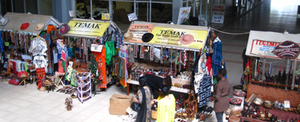Former war zones areas of study for Notre Dame MBAs
Published: December 17, 2009 / Author: Carol Elliott

In mid-December, when most students were heading into final exams, a group of Notre Dame MBA students were packing their bags and heading to the airport. Their plan involved studying a different kind of text than anything written in a book: real life in countries trying to rebuild their economies after a war or violent conflict.
The 19 MBA students are part of an innovative course, Business on the Frontlines, offered by the Mendoza College of Business at the University of Notre Dame. Taught by Viva Bartkus, an associate professor of business management, the students split into three teams and traveled to Lebanon, Kenya and Uganda. Their intention was to meet with business and civic leaders during their weeklong visit, and to learn about the challenges facing the various countries in restarting their economies.
Business on the Frontlines, first taught in spring 2009, consists of two parts: a classroom segment where students study developmental economies and topics related to peace-through-commerce efforts; and a week- to 10-day field visit to explore in detail the activities and impact of local and international business in post-war reconstruction societies.
Photos and blog entries about the current students’ trip can be found at: http://businessonthefrontlines.blogspot.com/
Bartkus traveled with the African teams; Edward Conlon, management professor and associate dean of the Mendoza College, accompanied the Lebanon team.
“I had hoped that the students would do a deep-dive into Lebanon, learning as much as they could in advance, and then use the time in the country to meet a rich cross-section of people, and to dig even deeper,” said Conlon. “And I think this plan worked beautifully. In just a week or so, the students have been able to ask very nuanced and well-informed questions of bankers, business people and political leaders that enable them to see both the opportunities and challenges faced by business in Lebanon and, indeed, the country as a whole.”
The students traveling to Lebanon with Conlon included Joe Boone, Jeff Hsu, Colin Kresse, Patrick Mulvehill, Omar Shaban and Xavier Navarro.
In Africa, the Kenya and Uganda teams observed entrepreneurial efforts ranging from farming to tourism possibilities. In the process, the MBAs learned about microfinance and the work being done by various churches to start and support businesses.
After talking with business leaders in the small town of Migori, the Kenyan team gave the leaders some time to turn the tables and ask about them about their lives. “Not a single person asked about life in the United States, or President Obama (who is an incredibly popular person here), or our school,” said MBA candidate Garrett Busch. “Everyone had only one question: ‘What advice can you guys as business students give me to help me improve my business?’ It isn’t just the business owners either. The whole country is just dying to learn more. They are so hungry for it, but their potential is just being handcuffed because of the lack of development and the government corruption.”
The Kenya team consisted of Garrett Busch, Eric Clark, Jon Phillips, Derek Tuttle, Chrissy Vaughn and Mirjam Wit. Traveling to Uganda was Devin Wagstaff, Kennis Wooten, Karl Jensen, Mat Ashley, Walter Alves, Ben Freeburg and Andrew Franger.
/news_and_events/news_articles/article/5125/former-war-zones-areas-of-study-for-notre-dame-mbas




